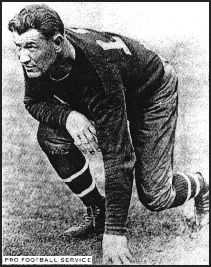
Jim Thorpe

Although he was voted by sportscasters as the greatest American athlete of the first half of the twentieth century, Jim Thorpe's life did not reflect that honored status. His gold medals from the 1912 Stockholm Olympics were taken away because he played semi-pro baseball in 1909 and 1910 (in 1983 those gold medals were returned to his family). Separating the amateur from the professional continues as a perennial problem in sports.
Uniting, not separating, the amateur (derived from Latin root of love or lover) and professional aspects of my life has been my desire. It is when the two are separated that my life slips into a deadly routine. The poets speak that truth. Kalil Girbran wrote, "Work is love made visible" and "when you work with love you bind yourself to yourself, and to one another, and to God." Another poet, Robert Frost, wrote this in "Two Tramps in Mud Time":
But yield who will to their separation,
My object in living is to unite
My avocation and my vocation
As my two eyes make one in sight.
Only where love and need are one,
And the work is play for mortal stakes,
Is the deed ever really done
For Heaven and the future's stakes.
Maintaining my amateur standing has been the determining factor in my several professional lives -- six years of ministry in a church, five years of teaching overseas, two years of testing the waters of academia, and twenty-eight years reincarnated as the minister of a church. In retrospect, I find that each professional change has been triggered by an evaporation of my amateur status. At the same time, enticing and enlivening new possibilities beckon.
I observe a pervasive disease worming its way into so many professionals' lives -- times when the focus on techniques and goals takes over from enjoyment of the process, when practice makes perfect replaces practice is perfect, and when the amateur is dismissed as being the opposite of professional.
In all fields familiarity breeds, if not contempt, boredom and weariness. For example, it is very easy for a minister to use the Bible as a source of sermons (and skip the personal life-challenging and life-changing quality of its words), to perfect officiating at baptismal and communion services (while losing the sacramental wonder), and to view church members as complainers or supporters (while overlooking the unique gifts and graces of each person). Professionals of all areas can list their own peculiar seductions. Tired eyes and drooping spirits are the visible signs of professionals' loss of amateur enthusiasm.
George Bernard Shaw wrote in his epistle dedicatory to Man and Superman:
This is the true joy in life, the being used for a purpose recognized by yourself as a mighty one; the being thoroughly worn out before you are thrown on the scrap heap, the being a force of nature instead of a feverish little clod of ailments and grievances complaining that the world will not devote itself to making you happy...
Losing one's professional standing - - as an attorney, physician or minister, as a teacher, athlete or elected official - can be traumatic since it affects one's livelihood and often one's sense of identity. More serious, though, is losing one's amateur standing, for it squeezes one's very soul.
© Robert H. Tucker, 2000.
Go to
Mind Matters Table of Contents Page.Go to
Bob and Maggi Tucker's Homepage.